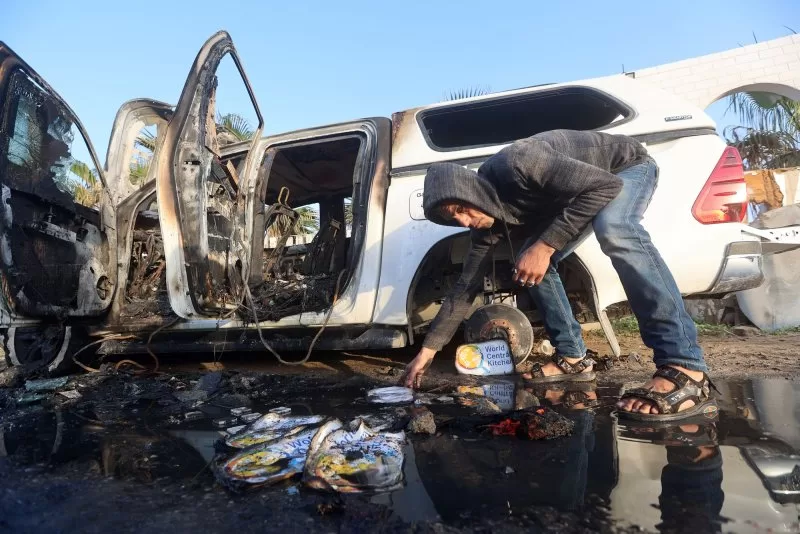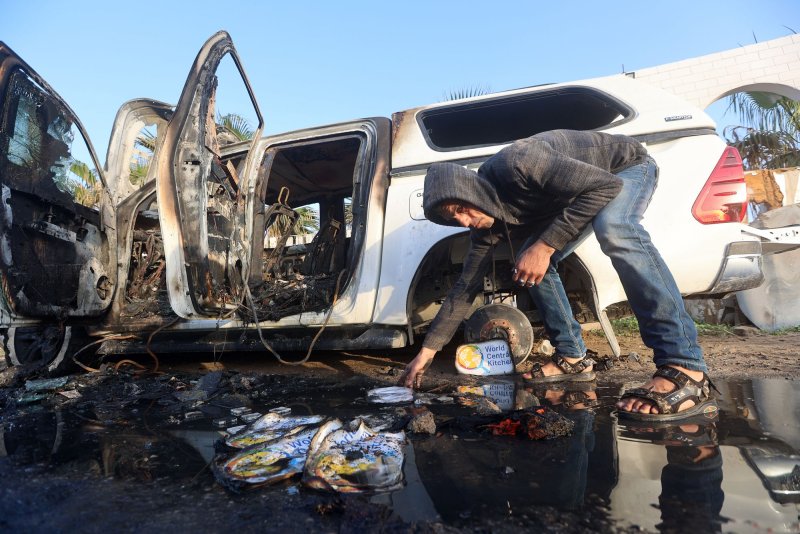A Palestinian man inspects the carcass of a car used by U.S.-based aid group World Central Kitchen that was hit by an Israeli strike in Deir al-Balah in the central Gaza Strip on April 1. On Friday, Australia said serious failures committed by Israeli resulted in the strike that killed seven WCK workers. File Photo by Ismael Mohamad/UPI |
License PhotoAug. 2 (UPI) — A report published Friday by Australia found fatal Israeli airstrikes targeting a World Central Kitchen convoy in April was the result of “serious failures” committed by the Middle Eastern country’s military.
Seven workers of the U.S.-based World Central Kitchen non-governmental organization were killed April 1 in three Israeli airstrikes on their convoy as they were in the process of moving aid in the Gaza Strip where Israel is waging war against Iran-backed Hamas.
The incident attracted international condemnation and marked a shift in the Biden administration taking a more vocal stance criticizing Israel for the method of its war in the Palestinian enclave.
Three British nationals, an American-Canadian, a Palestinian, a Pole and Australian Zomi Frankcom were among the dead.
A week after the strike, Australia’s foreign minister, Sen. Penny Wong, appointed Air Chief Marshal Mark Binskin as special advisor to the Australian government to investigate the strike.
His report published Friday found that while the Israel Defense Forces did not deliberately or knowingly target the WCK convoy failures to follow its own procedures, mistaken identification and errors in decision making resulted in the deadly strike.
According to the report, there was a “significant breakdown in situational awareness” partially attributed to the presence of locally hired security guards IDF confused for Hamas militants and a failure of the IDF to fully disseminate and read the convoy’s detailed movement plan.
“While the presence of armed gunmen with the WCK aid convey did contribute to the breakdown of situational awareness, ultimately, that is why professional and disciplined militaries, such as the IDF, have multiple controls in place to mitigate the associated risks,” Binskin said in the report.
“In this incident, it appears that the IDF controls failed, leading to errors in decision making and a misidentification, likely compound by a level of confirmation bias.”
Among the report’s recommendations is for Australia to maintain calls on Israel to evolve and improve coordination within the IDF and with NGOs and improve deconfliction measures in Gaza.
It also urges Australia to emphasize to Israel “the importance of adherence to the Law of Armed Conflict.”
Binskin concluded his report by stating Israel should make “an appropriate apology” to all the families who lost loved ones in the the strike.
Hong said in a statement that following the report that “Australia is pressing Israel to reform its coordination with humanitarian organizations to protect civilians and aid workers.”
“The Australian government will persist until proper protections for aid workers are in place. The best protection for aid workers — and civilians — is a cease-fire,” she said.
The IDF had launched its own investigation into the strike and had determined it was “a grave mistake stemming from a serious failure due to mistaken identification, errors in decision making and an attack contrary to the Standard Operating Procedures.”

